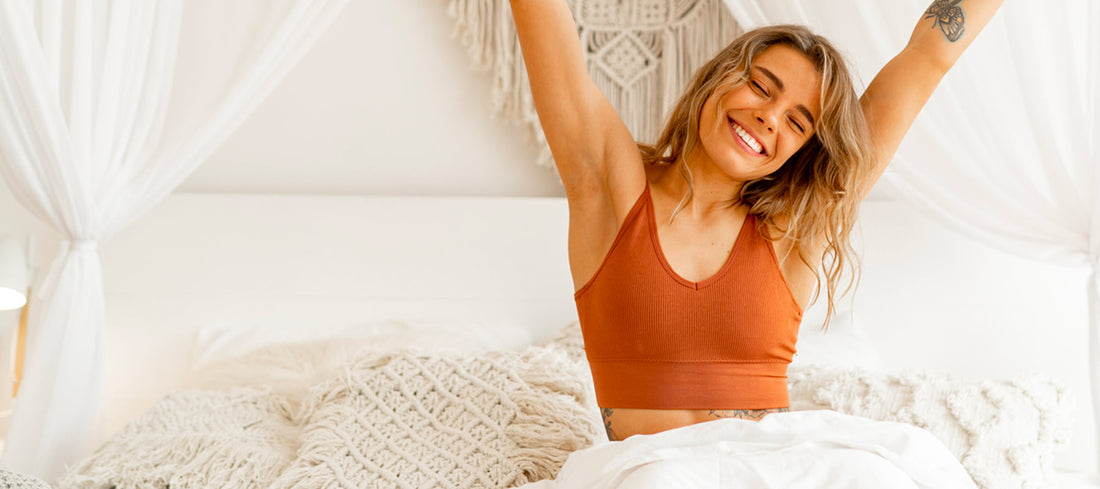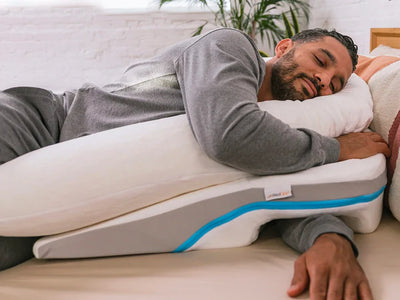
Related Product

Shoulder Relief System
$249.99 USD
Our system has a patented arm pocket that allows your arm to rest comfortably, alleviating pressure on your shoulder and triggering pain.
Sleep Hygiene: Sleep Hygiene Tips for Better Sleep
Share
There’s nothing better than waking up after a good night’s rest feeling refreshed and energized. There’s no need to lay in bed and repeatedly hit snooze on your alarm clock. Instead, you jump right out of bed and get ready for the day ahead. Getting a good night’s sleep is imperative in living a healthy and well-balanced lifestyle. But achieving that good night’s rest isn’t always so easy. Often we’re stuck lying in bed at night for hours, unable to fall asleep. You wake up in the morning feeling groggy and agitated and it turns into a vicious cycle of never getting enough sleep.
If this is something you’ve been dealing with, it’s time to focus on your sleep hygiene. Paying more attention to your sleep hygiene is how you can achieve that good night’s rest, every night. There’s no reason why you should settle for bad sleep. Making slight adjustments in your life and focusing on your sleep hygiene will set you up for a lifetime of better sleep.
In this article, we’ll be discussing the sleep hygiene definition, sleep hygiene tips, and more. Prioritize your sleep today and you’ll lead a happier and healthier life in no time.
- What is Sleep Hygiene?
- Why is sleep hygiene important?
- 6 Sleep Hygiene Tips
- Sleep Hygiene: Your Way to Better Sleep
What is Sleep Hygiene?
So, what is sleep hygiene? Sleep hygiene refers to good sleep habits that can help you achieve a better night’s rest. Good sleep hygiene can help you fall asleep and stay asleep. Good sleep has a direct impact on your mental and physical health, and the first step in getting good sleep is focusing on your sleep hygiene.
Good sleep hygiene means creating a bedtime routine that can help you fall asleep at night. That can be going to bed at the same time every night, listening to relaxing music, or reading before bed. Sleep hygiene will look different to everyone, but it’s important to find a routine that works for you. Poor sleep hygiene will have you laying in bed at night for hours, staring at the ceiling and unable to get your body and mind tired. No one wants that. Instead, focus on building good habits that can help you achieve a good night’s rest.
Why is sleep hygiene important?
Getting good sleep is crucial for both your physical and mental health. Good sleep helps you be more alert, feel more optimistic, make better decisions, and succeed socially. Good sleep is also beneficial for your physical health and can lower your risk of developing health problems down the road. But in order to get good sleep, you need good sleep hygiene. There’s a reason why people who get enough rest at night always wake up feeling refreshed and energized. Your body and mind needs sleep to properly function. Creating a healthy bedtime routine will benefit your sleep hygiene in more ways than you can imagine.
Just as there are many benefits of good sleep, there are also consequences of poor sleep. 60% of adults report having sleep problems multiple nights a week. That means more than half of adults just deal with getting poor sleep at night, rather than trying to find a solution. Poor sleep can impact your performance, mood, and overall health. Poor sleep hygiene can also impact your ability to drive safely, as you’re not as alert as you would be with a good night’s rest. Insufficient sleep can make it tough to focus and can slow your response time. It also can make you more irritable, which can impact our relationships with your loved ones. Poor sleep can also lead to health issues, like weight gain and a weakened immune system. Not getting good sleep can have a serious impact on the way you live your life and the way you interact with others.
Having good sleep hygiene will improve your sleep quality, which in turn will improve your mental and physical health. Check out these 6 sleep hygiene tips to help you get a better night’s rest:
6 Sleep Hygiene Tips

1. Set a dedicated sleep schedule
The first step in improving your sleep is creating a dedicated sleep schedule. That means going to sleep at the same time every single day, including the weekends. Setting a consistent sleep schedule will help get your body into rest mode and train your mind into getting tired at the same time. To train yourself to get to bed earlier, try exercising regularly and avoiding caffeine late at night. Also, try to avoid lying down after eating, as that can lead to numerous health problems which can impact your sleep. Dedicate 30 minutes before bed to winding down by stretching, reading, or listening to relaxing music. Going to bed earlier will also help you wake up earlier. Aim for at least 7 hours of sleep a night.

2. Keep your room clean and tidy
The reason you can’t fall asleep might just be because your room is messy. A constantly messy, cluttered room can impact your ability to relax at night. To get better sleep, try to eliminate physical stressors. That means keeping your room clean and tidy at all times. Stress and sleep are directly linked. The more stressed you are, the more that’s on your mind, and the harder it will be to fall asleep. Make it part of your daily routine to tidy up your room every morning to reduce some of that stress. A clean space is a clean mind.

3. Only use your bed for sleeping
I know, it’s tempting to use your bed for various tasks, like working, talking on the phone, and watching TV. As comfortable as your bed might be, try your best to only use your bed for sleeping. This will help your brain to associate your bed with sleep, which will make it easier to fall asleep. Even if you like to read or watch TV before bed, try to do it on the couch rather than in bed.

4. Eliminate napping
When you wake up earlier, it can be difficult to fight the urge to take a midday nap. But napping can seriously impact your ability to fall asleep at night. Try to limit your napping, or better yet, eliminate napping all together. If you absolutely need to take a nap, try to keep it under an hour and don’t nap after 3 p.m.

5. Create a comfortable sleep environment
If you’re struggling with how to sleep comfortably at night, you probably need to improve your sleep environment. A comfortable sleep environment can help you get relaxed and fall asleep quicker. It’s important to have a comfortable mattress, sheets, and pillows to help you feel secure in bed. Some people need to sleep in a dark, cool room in order to fall asleep. Other people need to sleep with earplugs in to eliminate outside noise. It’s also best to limit your exposure to bright light in the evening, so try to avoid using your phone or watching TV at least 30 minutes before going to bed. A comfortable sleep environment will look different for everyone, so try to find a system that works for you.

6. Exercise regularly
Exercising regularly will benefit your mental and physical health in countless ways- including your sleep. Being physically active throughout the day can make it easier to fall asleep at night. But being active doesn’t mean you have to do a full workout every single day. Just make it a goal to move your body in some way, whether that’s going to the gym or just going on a walk. Just be sure to avoid exercising later in the day as that can have adverse side effects on your sleep. Stick to exercising in the morning instead.

6. Find a comfortable sleep position
Your sleep position plays a big role in your quality of sleep. The reason for your bad sleep might be because you’re not sleeping in the right position. People are either back-sleepers, side-sleepers, or stomach-sleepers. The most common and comfortable position is sleeping on your side. Try to train yourself to sleep on your side rather than your back or stomach and your sleep quality will improve. If you’re wondering about sleeping sitting up, in most cases it’s safe to do as long as you’re comfortable and able to get enough sleep. At the end of the day, it’s just important to find a sleep position that works for you.

Sleep Hygiene: Your Way to Better Sleep
To improve your sleep, create a sleep hygiene checklist that you can follow every night. Go to bed at the same time every day. Avoid napping and caffeine. Exercise daily. Create a comfortable sleep environment. Following a sleep hygiene checklist will help make you more aware of your sleep habits. If you’re still struggling with falling asleep at night, MedCline sleep solutions is here to help. MedCline offers a variety of products that can help you fall asleep and stay asleep. MedCline has an acid reflux relief system, a shoulder pain relief system, and a therapeutic body pillow- all of which can help you achieve a more comfortable night’s rest. Getting good sleep is crucial in order to lead a happy and healthy life. Stop settling for poor sleep every night and focus on your sleep hygiene today.
Related Product

Shoulder Relief System
$249.99 USD
Our system has a patented arm pocket that allows your arm to rest comfortably, alleviating pressure on your shoulder and triggering pain.
